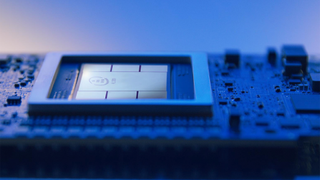Intel Builds Large AI Supercomputer: Xeon Meets Gaudi2
Stability AI first to use Intel's Xeon + Gaudi2 supercomputer platform.

Intel on Tuesday announced one of the world's first large deployments of its Gaudi2 accelerators for artificial intelligence (AI) workloads. The supercomputer will be used by Stability AI for its generative AI applications.
Intel's new supercomputer is based on the company's latest Intel Xeon Scalable processors and runs as many as 4,000 Intel Habana Gaudi2 AI hardware accelerators. Assuming that each machine employs eight Habana Gaudi2 processors in OAM form-factor (which is typical for OAM machines), the machine features as many as 500 nodes. Given that Intel's Gaudi2 offers formidable performance that's comparable to that of Nvidia's H100 in select applications, the supercomputer should be quite powerful. We're probably looking at 7–8 FP16 ExaFLOPS of AI performance.
Alibaba Cloud said that the 4th Generation Xeon can achieve a 3x inference speed in its model-serving platform DashScope program when used with Advanced Matrix Extensions (Intel AMX) accelerators and various software optimizations.
Intel's processors power numerous supercomputers and even Nvidia's DGX H100 systems for AI and high-performance computing (HPC) applications, but the company's own AI accelerators and compute GPUs are not as lucky and there are very few Gaudi/Gaudi2 or Ponte Vecchio-based AI deployments to date. With Stability AI working with Gaudi2, it will be interesting to see what other companies also choose to give it a shot.
Stay On the Cutting Edge: Get the Tom's Hardware Newsletter
Get Tom's Hardware's best news and in-depth reviews, straight to your inbox.

Anton Shilov is a Freelance News Writer at Tom’s Hardware US. Over the past couple of decades, he has covered everything from CPUs and GPUs to supercomputers and from modern process technologies and latest fab tools to high-tech industry trends.
Most Popular




